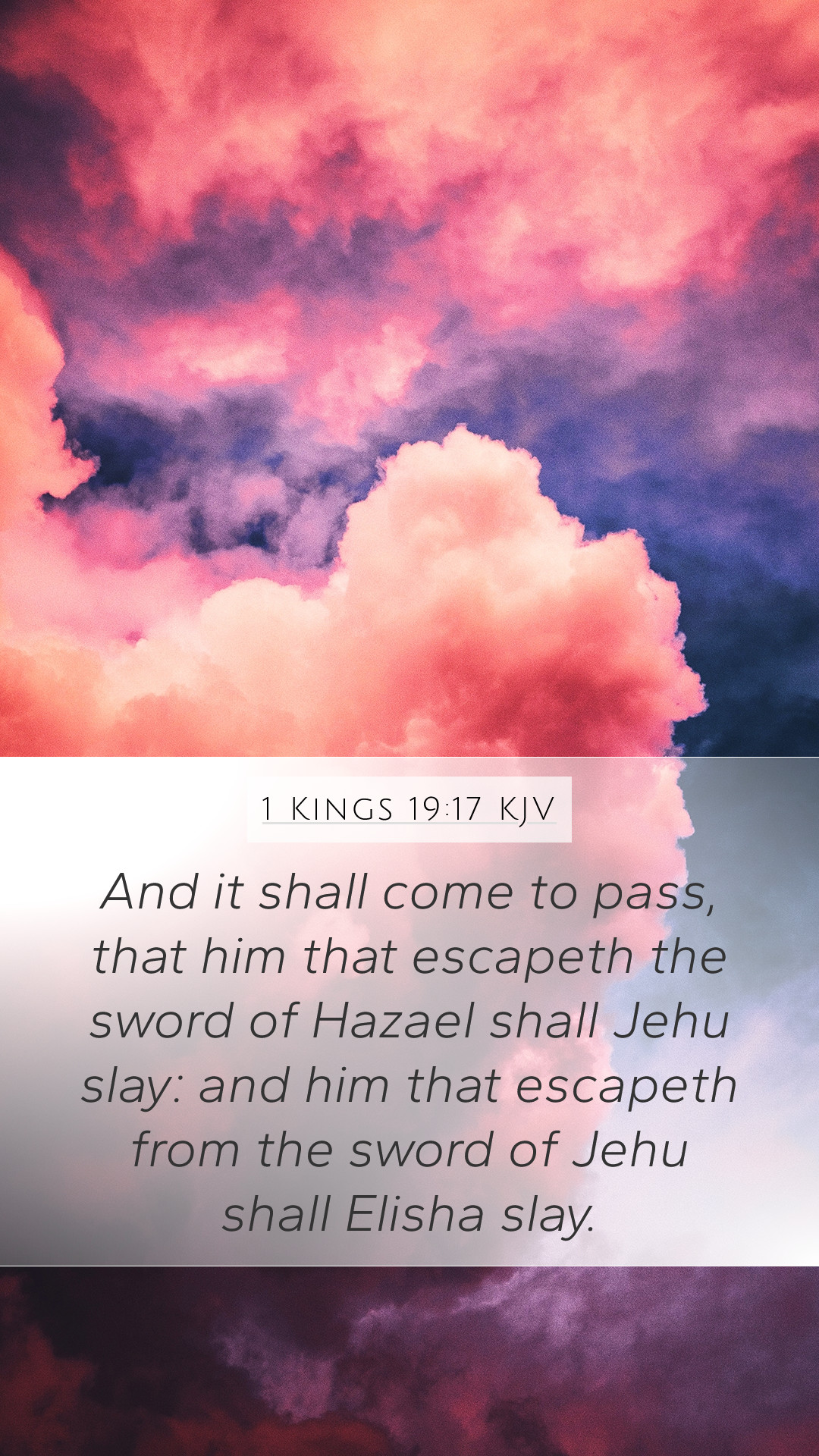Old Testament
Genesis Exodus Leviticus Numbers Deuteronomy Joshua Judges Ruth 1 Samuel 2 Samuel 1 Kings 2 Kings 1 Chronicles 2 Chronicles Ezra Nehemiah Esther Job Psalms Proverbs Ecclesiastes Song of Solomon Isaiah Jeremiah Lamentations Ezekiel Daniel Hosea Joel Amos Obadiah Jonah Micah Nahum Habakkuk Zephaniah Haggai Zechariah Malachi1 Kings 19:17 Meaning
What is the meaning of 1 Kings 19:17?
And it shall come to pass, that him that escapeth the sword of Hazael shall Jehu slay: and him that escapeth from the sword of Jehu shall Elisha slay.
1 Kings 19:17 Bible Verse Meaning
Understanding 1 Kings 19:17
Bible Verse: 1 Kings 19:17 - "And it shall come to pass, that him that escapeth the sword of Hazael shall Jehu slay: and him that escapeth from the sword of Jehu shall Elisha slay."
Overview of the Verse
This verse reveals God's judgment upon Israel through the appointed agents of destruction, emphasizing the inevitability of divine retribution against sin. It illustrates the judgment cycle that the people of Israel faced due to their disobedience and idol worship. The mention of Hazael, Jehu, and Elisha underscores a significant transition in leadership and prophetic authority.
Bible Verse Meanings
The verse speaks to the unalterable plan of God concerning the fate of Israel. It serves as a reminder of God’s sovereignty over nations and His ability to raise specific leaders to fulfill His divine purposes.
Original Context and Historical Background
Hazael was a military leader from Syria, Jehu was anointed as king of Israel, and Elisha succeeded Elijah as a prophet. This verse situates itself during a period of intense conflict between Israel and its enemies, emphasizing the severe consequences of Israel's covenantal failures.
Commentary Insights
-
Matthew Henry's Commentary:
Henry emphasizes the strictness of divine judgments and the specific instruments God chooses to execute His will. He reflects on the historical characters involved, suggesting that their actions were fulfilling God's prophetic word.
-
Albert Barnes' Commentary:
Barnes points out the cascading nature of judgment that occurs through these figures, indicating that escape from God's judgment becomes increasingly difficult. He interprets the actions of Hazael and Jehu as part of God’s overarching plan to purify His people.
-
Adam Clarke's Commentary:
Clarke delves into the significance of each individual mentioned in the verse. He highlights that every one of them had distinct roles in fulfilling God’s judgment and providential plan, identifying this as a critical juncture in Israeli history.
Scripture Analysis
This passage serves not just as a historical account but also as a theological reflection on God's governance over human affairs. It sheds light on issues of justice, accountability, and the assumed responsibility of leaders.
Application of the Verse
Understanding this verse in terms of contemporary life involves reflecting on leadership roles and the seriousness of covenant responsibilities. Believers are prompted to consider the implications of disobedience to God and the consequences that may arise.
Relevant Cross References
- 2 Kings 9:6-10: Anointing of Jehu as king, fulfilling God's directive against Ahab’s house.
- 1 Kings 21:21-22: Prophecy regarding the judgment on Ahab’s dynasty.
- 2 Kings 8:12-13: The introduction of Hazael and the prophecy about him.
Conclusion
This verse is a profound testament to the intricacies of divine justice and the execution of God’s plans through historical figures. The weight of God’s judgment underscores the seriousness with which He considers the struggles of His people and their leadership. In the broader context of biblical interpretation, this verse offers valuable Bible study insights and prompts reflection on the understanding of God's ongoing governance in contemporary times.
Further Study
For readers interested in in-depth Bible verse analysis and biblical exegesis, engaging with the provided commentaries can offer greater understanding of scripture and help illuminate the significance of similar passages throughout the Bible.


